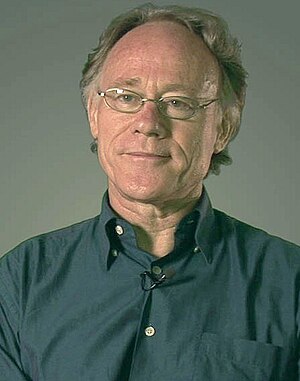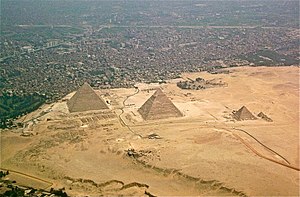Graham Hancock
Graham Bruce Hancock (born 2 August, 1950) is a British writer who promotes theories involving ancient civilizations and lost lands. Hancock postulates that an advanced ice age civilization was destroyed in a cataclysm, but that its survivors passed on their knowledge to hunter-gatherers, giving rise to the earliest known civilizations of ancient Egypt, Mesopotamia, and Mesoamerica.
Born in Edinburgh, Scotland, Hancock studied sociology at Durham University before working as a journalist, writing for a number of British newspapers and magazines. His first three books dealt with international development, including Lords of Poverty (1989), a well-received critique of corruption in the aid system. Beginning with The Sign and the Seal in 1992, he shifted focus to speculative accounts of human prehistory and ancient civilizations, on which he has written a dozen books, most notably Fingerprints of the Gods, The Message of the Sphinx, and Magicians of the Gods. His ideas have been the subject of several films, including the Netflix series Ancient Apocalypse (2022), and Hancock makes regular appearances on the podcast “The Joe Rogan Experience” to discuss them. He has also written two fantasy novels and in 2013 delivered a controversial TEDx talk promoting the use of ayahuasca.
Early life and education
Graham Bruce Hancock was born in Edinburgh, Scotland. He moved with his parents to India at the age of three, where his father worked as a surgeon. Having returned to the UK, he graduated from Durham University in 1973, receiving a First Class Honours degree in sociology.
Career
As a journalist, Hancock worked for many British papers, such as The Times, The Sunday Times, The Independent, and the Guardian. He co-edited New Internationalist magazine from 1976 to 1979, and was the East Africa correspondent of The Economist from 1981 to 1983.
Prior to 1990, Hancock’s works dealt mainly with problems of economic and social development. Since 1990, his works have focused mainly on connections he makes between various archaeological, historical, and cross-cultural phenomena.
In 2015, his Magicians of the Gods: The Forgotten Wisdom of Earth’s Lost Civilization was published by St. Martin’s Press. His first novel, Entangled: The Eater of Souls, the first in a fantasy series, was published in the UK in April 2010 and in the US in October 2010. The novel makes use of Hancock’s prior research interests and as he has noted, “What was there to lose, I asked myself, when my critics already described my factual books as fiction?”
Criticism and controversy
Hancock does not agree with most archaeologists that the earliest known civilizations arose independently. He argues that there was an advanced civilization during the last ice age; that it was destroyed in a natural cataclysm during the Younger Dryas climate event; and that its few survivors traveled the world introducing agriculture, monumental architecture, and astronomy to hunter-gatherers, giving rise to civilizations such as those in ancient Egypt, Mesopotamia, and Mesoamerica. Hancock argues that evidence is found in ancient monuments, which he believes are much older than archaeologists say, and in myths like Atlantis.
Hancock’s claims and methods are regarded by mainstream academia as pseudoarchaeology. In Archaeological Fantasies, Garrett G. Fagan points out that pseudoarchaeologists cherry pick evidence and misrepresent known facts. When apparently factual claims in their works are investigated it turns out that “quotes are presented out of context, critical countervailing data is withheld, the state of understanding is misrepresented, or critical archaeological information about context is ignored.”
On the other hand, there are researchers that support these ideas, and furthermore, the concept of prior, advanced civilizations has a basis in ancient Hindu cosmology, such as that expounded by Swami Yukteswar of India and his prominent student Paramhansa Yogananda (1893–1952), author of the Autobiography of Yogi, in which some of these concepts are presented along with the term yuga, signifying periodic ages of civilization, which Yogananda said was a corollary of the ages of the Greeks, the iron, bronze, silver, and gold ages. In a footnote in the Autobiography of a Yogi, Yogananda mentions that the famous philosopher Plato had a whole essay about Atlantis and its advanced state of scientific knowledge.
Orion correlation theory

Representation of the central tenet of the OCT, the outline of the Giza pyramids superimposed over a photograph of the stars in Orion’s Belt. To achieve this concordance, the pyramids have been rotated and scaled to suit. PHOTO CREDIT: Author User: Davkal; Date: 15 April 2009; Source, http://en.wikipedia.org/wiki/File:Orion_-_pyramids.jpg
One of the many recurring themes in several of Hancock’s works has been an exposition on the Orion correlation theory (OCT), supported by Belgian writer Robert Bauval and then further expounded in collaborative works with Hancock, as well as in their separate publications. OCT posits that there is a correlation between the location of the three largest pyramids of the Giza pyramid complex and Orion’s Belt of the constellation Orion, as intended as such by the original builders of the Giza pyramid complex.
Atlantis Reborn (1999)
Hancock and Bauval’s Orion correlation theory was the subject of “Atlantis Reborn”, an episode of the BBC documentary series Horizon broadcast in 1999. The program was critical of the theory, demonstrating that the constellation Leo could be found amongst famous landmarks in New York, and alleging that Hancock had selectively moved or ignored the locations of temples to support his argument.
Following the broadcast, Hancock and Bauval complained to the BBC Broadcasting Standards Commission, but the commission found that “the programme makers acted in good faith in their examination of [their] theories”. One complaint was upheld: that the program unfairly omitted one of their arguments in rebuttal of astronomer Edwin Krupp. The following year the BBC broadcast a revised version of the episode, ”Atlantis Reborn Again”, in which Hancock and Bauval provided further rebuttals to Krupp.
Ancient Apocalypse (2022)
Hancock’s theories are the basis of Ancient Apocalypse, a popular 2022 documentary series produced by Netflix. In the series, Hancock argues that an advanced ice age civilization was destroyed in a cataclysm, but that its survivors introduced agriculture, monumental architecture, and astronomy to hunter-gatherers around the world. He attempts to show how several ancient monuments are evidence of this, and claims that archaeologists are ignoring or covering up this evidence. It incorporates ideas from the Comet Research Group (CRG), including the controversial Younger Dryas impact hypothesis, which attributes climate change at the end of the Pleistocene to a massive meteor bombardment.
Archaeologists and other status quo experts have described the theories presented in the series as lacking in evidence and easily disproven. It has been criticized for failing to present any alternative hypotheses or contradicting evidence, and for unsubstantiated accusation that “mainstream archaeology” conspires against Hancock’s ideas. The Society for American Archaeology (SAA) objected to the classification of the series as a documentary and requested that Netflix reclassify the series as science fiction.
Other media appearances
Hancock gave a TEDx lecture titled “The War on Consciousness”, in which he described his use of ayahuasca, an Amazonian brew containing a hallucinogenic compound DMT, and argued that adults should be allowed to responsibly use it for self-improvement and spiritual growth. He stated that for 24 years he was “pretty much permanently stoned” on cannabis, and that in 2011, six years after his first use of ayahuasca, it enabled him to stop using cannabis. At the recommendation of TED’s Science Board, the lecture was removed from the TEDx YouTube channel and moved to TED’s main website where it “can be framed to highlight both [Hancock’s] provocative ideas and the factual problems with [his] arguments”.
Hancock has appeared on “The Joe Rogan Experience” podcast several times.
In popular culture
In 2009, Roland Emmerich released his blockbuster disaster movie 2012, citing Fingerprints of the Gods in the credits as an inspiration for the film, stating “I always wanted to do a biblical flood movie, but I never felt I had the hook. I first read about the Earth’s Crust Displacement Theory in Graham Hancock’s Fingerprints of the Gods.“
Attribution
- Some content on this page may previously have appeared on Wikipedia.

